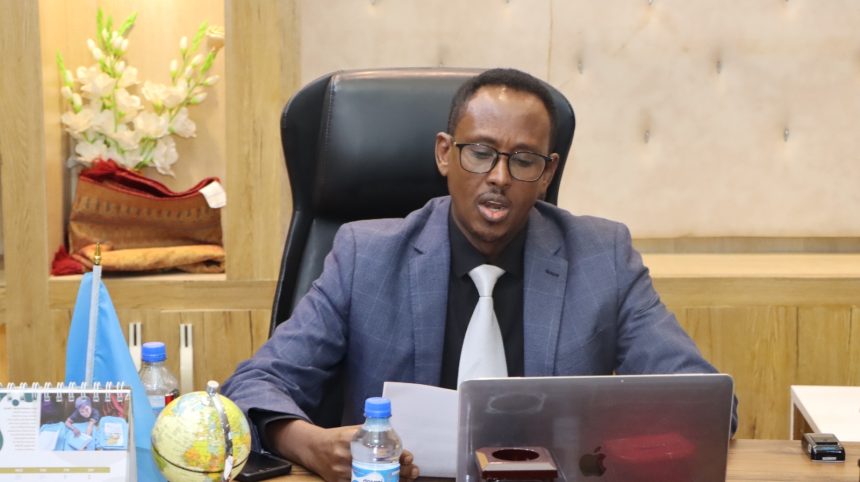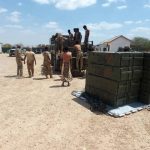The Ministry of Communications and Technology organized a conference at its headquarters in Mogadishu, the capital city. The event, led by the Ministry’s Director General, brought together academics, researchers, and national activists, with participants joining both locally and internationally. The discussion centered on the significance of digitization in today’s world, under the theme, “Preserving Our Mother Tongue, Cultural Heritage, and the Rich History of Our Nation.”
A range of challenges and threats was explored, along with the vital role of digitization in safeguarding and providing access to the cultural heritage and linguistic rights of the Somali people for government bodies, experts, and other stakeholders.
In his opening speech at the convention, Mr. Abdul Aziz Duwane Isaac, the Director General of the Ministry, emphasized the significance of safeguarding the Somali language, culture, and history amidst the challenges of globalization and conflicts. He stated, “Our language lies at the core of our culture, embodying our stories, wisdom, and the values passed down by our ancestors. Meanwhile, our heritage and traditions stand as testaments to the resilience and creativity of the Somali people. However, both our culture and heritage are under grave threat due to exposure to foreign influences through globalization, neglect on our part, and the conflicts surrounding us.”
The convention under the title, “Preserving Our Mother Tongue, Cultural Heritage, and the Rich History of Our Nation.”was facilitated by Mr. Mohamed Abu Bakr Ismail, the Director of Broadcasting and Satellites, and attended by Mr. Abu Bakr Hassan Moallin, the Head of the Academic Affairs Department at the National Institute of Communications and Technology within the Ministry.
Benefiting greatly from the insights shared by attendees, the convention was blessed particularly by the attendance of Professor Mohamed Elmi “Tohow,” the Director of the Culture Department at the Academy of Sciences, Culture, and Literature. He provided a succinct overview of Somali history, emphasizing the ancient achievements of the Somali people both on their land and beyond. He highlighted that the current period of decline is merely a fleeting chapter in a history marked by self-assurance and respect from nations across Africa, Asia, and Europe.
Mohamoud Mohamed Hassan, a researcher and media professional with a keen interest in the Somali language and dictionaries, provided an insightful overview of the significance of digitization for preserving and sharing historical and cultural materials. He emphasized the substantial benefits it could bring to the Somali people, discussing the opportunities available for those invested in the Somali language and culture, as well as the technologies that aid in their conservation and dissemination. Mr. Hassan highlighted the importance of creating systems for archiving, recording, and sharing these resources on the World Wide Web, alongside developing translation programs that leverage existing dictionary data in collaboration with national academies. This initiative aims to enhance access to information and knowledge about Somalia for its citizens, catering to their interests in various fields, including science, arts, and crafts. He also referenced the successful Swedish experience with the “Wikipedia” encyclopedia as a model, suggesting that similar strategies could be implemented on a broader scale to meet the needs of the Somali context.
Historical researcher Ardon Sheikh Ibrahim addressed the risks confronting our heritage both domestically and abroad. He emphasized the importance of accurately documenting facts and artifacts within and outside the country, as well as disseminating this knowledge through the International Network. Ibrahim drew attention to the precarious state of the shrines of significant Somali figures in the Arab Republic of Egypt, specifically highlighting the tombs of the great Somali scholars Fakhr al-Din al-Zayla’i and Abd al-Rahman al-Jabarti, alongside their associated relics and manuscripts, which are at risk of demolition and removal after years of neglect. He also mentioned the actions of certain museums that distort Somali history, feeling unmonitored, and stressed the urgent need for government agencies to take action to protect what can be preserved.
Ms. Bushra Ali Nadir of the Somali Women Journalists Union shared insights on the significance of promoting awareness of the Somali language’s roots and history. She emphasized the need for reliable historical materials to be made available digitally, aiding both researchers and media professionals without specialized training. Journalist Salma Hassan Abdullah from TV Shabelle echoed this sentiment, pointing out that the scarcity of digital information allows some ill-intentioned individuals to question the very existence of the Somali people. The contributions from both Ms. Nadir and Ms. Abdullah were met with enthusiasm from the participants, invigorating the discussion.
Ahmed Samir Sulub from Himilo TV platform, an activist and historian, pointed out that Somali society is at significant risk due to the lack or inadequacy of history curricula. He highlighted the shortage of educational materials and the challenges in accessing them, particularly emphasizing the limited resources available to students in public, community, and private schools. As a result, entire generations remain unaware of their history, the notable figures among their ancestors, the lands their forebears governed, and their standing in relation to other peoples. Some generations even come to believe that many of their historical luminaries originated from other nations. Mr. Sulub views this situation as a pathway to the potential extinction of our people, given the moral and intellectual decline it represents. However, he believes that efforts to digitize educational resources could help make these materials accessible until comprehensive curricula are developed to address this critical need.
Mr. Abdul Nasser Omar Osman, the advisor to the Minister of Agriculture and Irrigation, provided a concise summary of the unique and rare crops and plant species indigenous to our country, along with efforts to preserve and catalog them. He updated the audience on the nearing completion of a standards and specifications department within the ministry. He emphasized that a crucial part of the ministry’s conservation initiatives for the country’s vegetation and biodiversity relies on the successful digital collection and preservation of data. This information will be shared with various state agencies, researchers, and interested parties to maximize the benefits of our natural resources. Additionally, he discussed the need to establish programs aimed at protecting rare and endangered species, as well as those of cultural significance to our people. He also stressed the importance of showcasing the cultural aspects of agricultural and forestry practices, highlighting the unique characteristics of our land, environment, and community as a means of fostering both distinction and unity among our population.
In his closing remarks, Mr. Mohamed Abu Bakr Ismail extended his heartfelt thanks to the conference attendees on behalf of the Ministry of Communications and Technology, recognizing their significant contributions. He stressed the importance of taking all the ideas presented during the conference seriously and taking action on them. Furthermore, he reassured participants that this convention would not be the last, and both he and the ministry would strive to enhance participation in future events by including representatives from all pertinent ministries and agencies.





